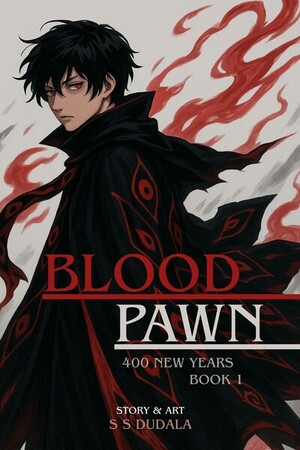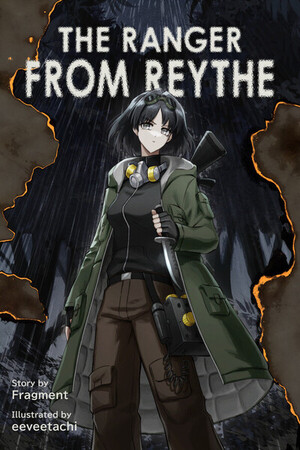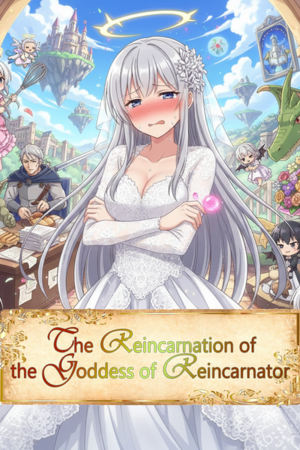Chapter 36:
"Colours of Quiet Bonds"
Blood Pawn : 400 New Years (Book 1)
The heavy wooden door of the church creaks shut behind me as I step into the cool, incense-touched stillness.
“Sister Lili? Oliver?” My voice echoes gently off the stone walls and stained-glass windows, fractured light painting the floor in red and gold. “Anyone here?”
From the far hallway, soft footsteps—measured, unhurried—then Sister Lili appears, robes the color of faded sky, a linen cloth still in her hands. She offers a calm smile, but her eyes flick to the bundle at my side.
“They waited for you, Orion. But the others headed off to the vegetable market not long ago. You just missed them.”
I nod, faint but deliberate. “Oh… alright.” I glance toward the stairway, the shadowed corridor leading up. “Is Lila here? Or Mina?”
She tilts her head, thinking. “Mina went with the group. But Lila is upstairs. She wanted some quiet.”
Perfect.
“I was thinking I’d spend some time with Lila,” I say, my voice even, purposeful. “Just a bit. If that’s alright.”
She studies me a moment too long—suspicious, but not enough to stop me.
“Be careful,” she says at last. “She’s in one of her quiet moods.”
I offer a slight smirk. “Isn’t that every mood?”
The joke lands gently. She exhales, waving me off. “Go.”
I climb the stairs slowly. Each wooden step groans beneath my boots. The corridor narrows the higher I go, stained-glass windows casting ribbons of blue, green, and amber across the stone walls. Dust hangs in the sunlight like lazy sparks.
At the top, her door is cracked open—just enough.
Inside, Lila sits by the window, sunlight outlining her like a frame. Her back is straight, posture still. One hand steadies a page on her lap while the other moves a stubby pencil with soft, delicate strokes. She's sketching rooftops—chimneys, crooked shingles, and the winding path that leads out of town. Her hair is tied loosely, a few strands falling forward across her cheek.
The room smells of lavender and worn paper.
She doesn’t hear me. Of course she doesn’t.
I lean on the doorway, watching in silence. A breeze drifts in through the open window. Her page flutters.
She reaches for it.
Overextends.
The chair tips.
I move.
My hand shoots forward, gripping the back of the chair just before it topples. With the other, I catch the paper mid-air.
Her head snaps up—storm-gray eyes locking with mine.
For a second, everything is still. She’s frozen. Breath caught.
I hold the paper lightly between two fingers. “Careful,” I say, voice smooth, but not warm. “Your masterpiece nearly escaped.”
She doesn’t reply—just stares.
I step in fully, setting the chair back on its legs. With my other hand, I offer the sketch.
She blinks, slowly taking it back, her fingers brushing mine.
Then slowly… her lips curve into a soft, soundless “thank you.”
I release the chair gently and offer her the paper. Our hands brush. Her fingers are warm. Her pulse is quick.
Mine?
Unchanging.
“Interesting,” Love murmurs inside.
“Even you paused.”
Lila stands, still holding the sketch. Then she walks to her desk, moving with careful steps, like each one has meaning. She picks up a piece of chalk and scribbles on her slate. Turns it to me.
“Thank you”
The silence hums again. But it’s not cold this time.
It’s... patient. Listening.
Lila’s eyes flick up, just for a second. Then down again. Like a bird—soft, light, always one breath away from flight.
I lift my hand. Try a sign.
Sloppy, half-right. I only remember the basics.
But I do it anyway.
“I’ll always be there for you.”
Her gray eyes widened. Not fear.
It’s something softer. Something that swells—then retreats just as fast.
Her fingers tighten around the paper. She hides her face behind her shoulder, her hair slipping forward like a curtain.
I blink.
My eyes drift to her drawing again. The pencil lines are faint but intentional—two children on a dirt path, one walking ahead, the other just behind.
Not side by side. Not hand in hand.
Just... near.
I gently lift the sketch from her fingers, flashing her another rough sign.
“It’s good.”
She practically curls in on herself—shoulders drawing in, cheeks burning red.
Cute.
I lean a little closer. “If you color it,” I hand sign slowly, “it’ll be even more beautiful.”
She straightens, startled. Then turns fast—grabbing her slate. She wipes the old words quickly and writes something new.
“I don’t have colors.”
I read it.
Pause.
Then, steady hands, I raise another sign.
“I’m here.”
And for a moment, I don’t think.
I just take her hand.
She jolts—small, startled—but doesn’t pull away. Her hand is cold, soft, smaller than mine. I don’t hold tight. Just enough for her to know I’m not letting go yet.
The drawing stays in my other hand as I gently lead her out of the room.
She follows. Always half a step behind. Just like her sketch.
The stairs creak beneath us. Afternoon light spills in through the hallway windows, warm and golden, dust floating like soft glitter in the air. The scent of lavender fades, replaced by the earthy smell of the kitchen below.
We reach the pantry. Sister Lili is stacking jars of dried beans, humming a lullaby only older women seem to remember. The light from the stained glass near the pantry door casts streaks of green and gold across her robes.
I stop in the doorway, Lila still quietly at my side, and lift my voice.
“Sister,” I begin, tone calm but purposeful, “do you have any paints or colors? Lila wants to finish a drawing.”
She turns toward me, hands still holding a jar of herbs. Her face softens, but her answer is already on the way.
“No, dear. Not here,” she says gently, her voice touched with the weight of too many similar requests. “Paints are quite expensive in this part of town. The merchants sell them at marked-up prices.”
She pauses, glancing toward the half-empty shelf. “And we’ve… run out.”
Lila watches her closely, reading her lips. When Sister Lili gives that slow, apologetic shake of her head, Lila’s shoulders drop the tiniest bit. Then she taps me lightly on the sleeve.
I turn to her.
Her hands move slowly.
“It’s okay.”
The sign is simple. The smile she gives afterward is simpler.
Small. Fragile. But… real.
I study her for a second longer. Her hands lower to her sides. She doesn’t flinch. She’s used to disappointment—of getting close, but not enough.
I glance past Sister Lili, to the back wall of the kitchen. Sunlight cuts through the high stained-glass pane, landing in a perfect square on the floor—warm, gold, bright.
The same light I imagine behind her in the drawing.
My fingers tighten around the paper still in my hand.
But I don’t push. Not yet. I just nod, slowly, and squeeze Lila’s hand once. Not too tight.
Just enough to say: I heard you. I’m still here.
Then I shift, moving to lean over the old wooden counter. The surface is scratched and worn smooth by decades of use—mortar marks, knife grooves, flour stains that never fully faded. My palms rest flat against it, warm and steady.
“Sister Lili,” I say, keeping my voice casual—but just sharp enough to cut through her focus, “do you have any cornstarch, a big strainer, a mortar and pestle, and a few large bowls?”
She turns fast, almost dropping the jar in her hands. Her eyes narrow with suspicion.
“Cornstarch?” she echoes. “Strainer? What in the heavens are you trying to cook now, Orion?”
There’s a twitch at the corner of my mouth. Not quite a smile. More of a warning.
I look her dead in the eye. “Not food.”
Pause.
“Paint.”
Her brows furrow deeper, as if I’ve started speaking in tongues. “Paint?”
I let the silence hang for a beat, then raise the drawing between two fingers.
“Natural colors,” I say, voice low and calm. “Just need the tools.”
Behind me, Lila stands quietly, hands folded in front of her, her wide eyes shifting between us. She says nothing—as always—but I can feel her anticipation buzzing in the space between her stillness. It hums beneath her skin like a heartbeat she won’t speak aloud.
Sister Lili lets out a long, theatrical sigh, like she already regrets saying yes. “Fine,” she says at last, setting the herb jar down with a click. Then she lifts a single finger—sharp, declarative, a threat wrapped in motherly authority. “But if you use these things, you two are scrubbing them spotless after. Understood?”
I nod immediately. No hesitation. “Deal,” I say. Then glance sideways at Lila and let a small grin curl my lips.
She blinks at me, puzzled. Curious. Waiting.
I raise my hands—slowly, not perfect—and shape the signs as best I can:
“We’re going to make colors. Together.”
Her eyes soften. Her lips part ever so slightly. A faint blush colors her cheeks as she nods once, delicate as a leaf in wind.
Sister Lili mutters something under her breath about "troublemakers with charm" as she begins placing the tools onto the counter—bowl after bowl, the old pestle and mortar, a dusty sack of cornstarch. The kitchen fills with the scent of dry grain and lavender soap.
And then—chaos.
The front door swings open with a dramatic creak and a gust of wild energy. Children’s voices tumble in like a sudden summer storm.
“Orion!” Mina crashes through the threshold like a bolt of pink and pigtails, nearly colliding with my legs. “Let’s play, let’s play!” she chants, bouncing like she’s spring-loaded.
I catch her before she bowls over Lila or the bowls.
“Whoa there,” I say, chuckling, crouching slightly to match her height. “Today we’re doing something even cooler.”
She pauses, wide-eyed. “Cooler than tag?”
I lean in, voice low, conspiratorial. “We’re going to make colors.”
Her gasp is so dramatic I almost laugh. “Colors?!”
Behind her, the others trail in—Ethan with a basket under one arm, Oliver juggling potatoes and nearly dropping one, Callen dragging his feet like he’d rather be anywhere else. The air turns rich with the smell of vegetables—earthy, warm, raw. Carrot tops poke from woven bags. Dust from the road still clings to their boots.
“Make colors? With what?” Oliver pipes up, raising one skeptical brow. “You gonna squeeze carrots on paper?”
I smirk, unbothered. “You’d be surprised what carrots can do when you know how to talk to them.”
While Oliver’s still trying to decide if I’m joking, Ethan walks past him toward Lila. The moment they’re close, they start signing—fast, fluid, perfectly in sync. I catch Ethan asking what’s happening. Lila responds with sharp, graceful motions.
And for the first time, she’s glowing. Just a little. Not from sunlight—but from something behind her smile.
I catch myself watching her. Just for a breath too long.
Then I turn back to Sister Lili. My voice steady. Controlled.
“Can I borrow just a bit of beetroot? Some coffee powder? Maybe a pinch of turmeric?”
She gives me a long stare, the kind that says she’s already predicting the cleanup this will cause. Her hand plants firmly on her hip, and her tone is drier than sand.
“If it goes to waste—”
“I won’t waste a speck,” I cut in, already reaching for the mortar. “Every drop will become something.”
She stares at me for a second longer, then finally exhales and nods toward the pantry without another word.
I grin. “Alright, you heard her!” I call to the group, my voice slicing through the air like command velvet-wrapped in charm. “Mina—grab the beetroot. Ethan, get the turmeric. Oliver, coffee powder. Lian, start laying out the bowls outside on the porch table.”
They scatter with surprising speed. Good. I watch them go—each one slipping into motion, following without pushback. The small victories always start like this.
I lift the sack of cornstarch with one arm like it’s a relic and nudge Lila lightly with my shoulder. She looks up, curious, questioning.
“Let’s go,” I say.
She nods, her slate tucked under her arm, and walks beside me through the back doorway. The sun greets us like an old friend—warm and blinding. The smell of late morning clings to everything: turned soil, wind-dried linen, faint iron tang from the blacksmith down the road. A few pigeons flap noisily across the roof beams above.
We step into the open courtyard where the old table waits—splintered at the edges but strong, stubborn. Like the children gathered around it.
I drop the basket with a solid thud, the sound echoing against the stone walls.
Ethan arrives next with a small jar of turmeric. He sets it down gently. Oliver tosses a pouch of coffee powder with a little too much flair—some of it spills onto the table. I raise an eyebrow. He shrugs unapologetically.
Mina bounds in with a fistful of leaves—half green, half questionable.
I narrow my eyes. “I said healthy, not compost.”
She giggles, drops the pile dramatically onto the bench, and races back out to correct her mistake.
The table now looks like a market stand exploded—bowls, bundles, broken petals. I love it.
“Alright,” I say, voice low but carrying weight. I let silence follow the word for just long enough to make their focus tighten.
“Mina, your job—leaves. Green, big, healthy. No dry ones.”
She salutes with a beaming grin and dashes toward the hedges.
“Ethan,” I continue, pointing, “charcoal from the burnt logs pile near the fence. And someone—get blueberries. Or any flower with real color. Bright. Saturated. Bring as much as you can.”
Callen doesn’t argue. He nods and heads toward the side path, already calculating where to scavenge.
No hesitation. No wasted time. They move.
And that’s power.
I turn to Lila. She hasn’t moved. Her eyes flick over every detail, absorbing it all without speaking. Her hands are folded, her slate untouched. But I can see it—she’s storing everything.
I lower my hands and sign slowly:
“Watch. I’ll show you.”
She blinks, then nods, and moves to sit at the low stone edge of the fountain. Her knees tuck under her, skirt billowing slightly as she rests her hands in her lap. The breeze lifts strands of her hair, and for a moment, the sunlight kisses her shoulders like she belongs to a painting.
I glance once… then turn away before I think too long about what that means.
From the basket, I take the beetroot, thick and dark, still damp from the root cellar. I slice it into chunks, small enough to crush. Juice bleeds immediately—deep red, like ink spilled over parchment.
I drop them into the mortar.
My fingers stain instantly. I don’t mind. This is how art begins: in mess, in weight, in effort.
I grip the pestle and press down. The sound is thick—wet pulp pressed beneath stone. A slow rhythm begins, heavy and deliberate. Crush. Turn. Crush again.
Color bleeds, rich and bold. It seeps into the grooves of the stone like it’s always belonged there.
I feel her gaze.
I don’t look back.
I just keep grinding.
And smile.
The mixture resists at first, but I don’t stop. A little water. More grinding. A rhythm. Soon it becomes a deep red paste. I dip my fingers in—it stains beautifully.
Perfect.
I bring the strainer over one of the big bowls and carefully pour the beet paste through it. Thick, vivid liquid drips into the white cornstarch, glowing like blood in sunlight.
I glance at Lila and sign, "Mix it. Gently. Until it’s smooth."
She blinks, then gives a shy nod. Her fingers brush mine as she takes the bowl. I pretend not to notice the skip in my chest, but the heat in my ears betrays me.
The mixture resists at first—thick, stubborn, too fibrous—but I don’t stop. A little water. More pressure. A rhythm. My movements tighten, deliberate. Soon the beetroot transforms into a deep, rich paste. I dip my fingers into it and drag them across my palm.
It stains beautifully.
Perfect.
I bring the strainer over one of the large earthen bowls, then tilt the mortar carefully. The beet pulp glops through, thick and vibrant. Each drop splashes into the white cornstarch below like blood bleeding into snow. A pulse of color.
I glance sideways, catching Lila watching me again. Her gaze flicks between the bowl and my hands.
I lift mine and sign, “Mix it. Gently. Until it’s smooth.”
She blinks, then nods slowly. That quiet obedience again—not from fear, but trust. Her fingers brush mine as she takes the bowl. Just a touch. Light as air.
I pretend not to react, but the heat in my ears gives me away. My hand lingers a half-second too long before I turn back to the table.
She kneels beside the bowl, sleeves rolled just past her elbows. Her movements are graceful, practiced. Her small hands stir with precision, folding the cornstarch into the pigment like she’s painting a spell into the earth. The red deepens, thickens, glows. Her world narrows into that bowl—and I let myself watch.
It’s... grounding.
Then a sound cuts through the stillness like a pebble breaking a pond’s surface.
“LOOK! LOOK!” Mina barrels toward us like a squirrel on sugar, arms cradling a bundle of crushed green leaves. “The best leaves in the whole garden!”
Her cheeks are bright pink, her pigtails bouncing wildly as she skids on the stone tiles. She stumbles.
I react instantly, catching her elbow before she can crash into the bowls.
“Easy,” I say, steadying her. My voice is calm, but clipped. “This isn’t a race. But... good job.”
She looks up, breathless, then grins like a little sun. “I ran fast! Like a dog chasing butterflies!”
“Hopefully not into trees,” I mutter, but take the bundle from her hands.
I place the leaves onto the chopping board, their edges still damp with dew. The scent is green—fresh, sharp, a little like crushed mint. My knife moves quickly: shrrk-shrrk. Each slice clean. The board stains with green sap, a messy mosaic beneath my fingers.
Lila watches nearby, still kneeling, her eyes following every cut. She’s not just curious—she’s learning. Cataloguing. Smart.
Once the pile is chopped fine, I scrape the pulp into the mortar and begin grinding again. This texture fights back—fibers tangle, resist—but pressure wins. Always.
Add water. More grinding.
Green bleeds out slowly, seeping from the crushed veins, until the paste looks like wet moss.
I pour it through the strainer and catch the juice in a clean bowl. Bright green leaks through the mesh like emerald tears. Satisfying.
“Mina,” I say, sliding the bowl her way. “Mix this well. Slow. No splashing.”
She salutes. “On it, Chief!” She drops to her knees beside it like she’s guarding a sacred recipe and starts stirring with both hands—too fast at first, but I let her have the moment.
Lila finishes her red mixture and lifts the bowl carefully. Her hands are stained beetroot pink, fingertips smudged like a painter’s. She holds it toward me, eyes searching mine.
I take it, brushing her fingers again. This time, I don’t hide the way I hold that second longer.
The mixture is perfect—smooth, silky, rich. I nod.
“Wash your hands,” I sign, slow and clear.
She tilts her head for a second before her eyes brighten in understanding. Then she rises and glides over to the stone basin, silent as ever, trailing light with her like a ribbon in the sun. Her small hands dip into the cool water, and the red beet stain begins to swirl away.
The mixture in her bowl glows—red as crushed rose petals, smooth and rich. I place it beside Mina’s, and immediately the contrast pops. One bold and wild, the other deep and elegant. Using less cornstarch was the right call.
Then—
“Here!” Oliver crashes back onto the scene like a human storm, panting heavily as he drops a bundle of mashed blueberries onto the table. His hands are stained purple already. Of course he squashed half of them before even getting here.
“They’re fresh!” he says, beaming. “Some even still have bugs on them!”
“Charming,” I mutter.
Behind him, Ethan follows with quiet focus, holding out a few sticks of dark charcoal wrapped in cloth. His eyes flick to me, waiting for approval. He says nothing, but he doesn’t need to. Reliable as ever.
Callen walks up last, his expression unreadable, a bundle of crimson temple petals cupped delicately in his hands. He shrugs when I raise an eyebrow.
“Didn’t see any paint in the flowers, but figured you’d want ‘em anyway.”
“Smart,” I reply.
No wasted effort.
I get to work.
First—the blueberries. They burst easily, and I crush them with practiced force, the juice sticky and fragrant, staining my palms violet. The scent is cloying, sugary, and vaguely nostalgic.
“Who brought these?” I ask without looking.
“Me!” Oliver grins.
I slide the bowl toward him. “Then you stir it. No lumps. No splashes. Make it look like something people would actually use.”
He salutes. “Yes, boss!”
Next—the charcoal. Ethan stands ready, silent, like a soldier at inspection.
I crush the sticks with the mortar until they turn to fine powder, add a little water, stir until it becomes a thick, black paste. It looks like ink—dense and rich. I add cornstarch, just enough.
I pass it to him.
“Make it look like shadow,” I say. “Not sludge.”
He nods once, already stirring.
Finally—Callen’s petals. I press them in slowly, grinding with more care this time. They don’t bleed easy, but I’m patient. Pressure wins.
Callen watches from the side, arms crossed. “Never thought flowers could bleed,” he says.
I don’t answer. I just keep pressing. The color finally seeps out—faint at first, then stronger. It’s not the raw red of beetroot. It’s lighter. More refined. Elegant. Almost... shy.
I hand him the mix.
“Don’t break it,” I say. “It’s delicate.”
He tilts his head. “Noted.”
Now the table is full. Bowls in a row—each one a different hue. Red. Green. Blue. Black. Soft pink.
All made from the earth. All made by us.
Sunlight spills across the table from the high church windows, setting the colors alight like stained glass liquefied. There’s silence—brief and rare—as the others stare.
“Alright,” I say, wiping my stained hands on the cloth. “Time to seal it.”
I head inside, back to the storeroom. The air is cool, dry, thick with parchment and candle wax. I find a bundle of unused papers—yellowed at the edges but still intact. Perfect.
I return, spreading the sheets on the table like parchment for kings. Then, with spoons, we pour.
Color by color.
Each child spreads their pigment across a paper—thin layers only. Too much and it’ll crack. Too little and it’ll fade. I guide them—correct hands, adjust pressure.
The colors drink into the paper. Red seeps like fire. Blue pools like dusk. Green glows like moss. Black streaks like ink from a forgotten war journal.
Lila is the most precise. She handles her brush like she’s holding breath.
“Don’t touch them now,” I say firmly, stepping back to survey the work. “Let them dry. Sun only. No smudging. No peeling.”
Everyone nods.
They understand now. This isn’t just art. This is creation.
I tap the edge of the table with the pestle. A soft metallic knock.
“Tools. Gather them all. Meet me by the washing basin. We clean everything. That was the deal.”
A chorus of groans follows. Oliver throws his head back dramatically. “Even this?” he asks, pointing at the mortar.
“Especially that,” I say, already carrying it under one arm.
But no one argues. Not really.
Because the colors—they were worth it.




Please sign in to leave a comment.